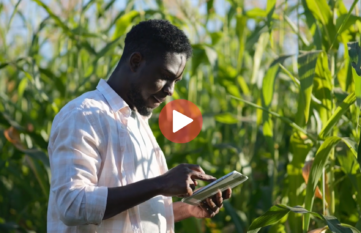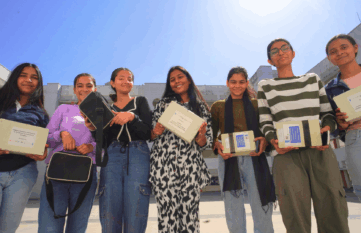AI meets Jungle: How Artificial Intelligence is saving Indonesia’s forests

In the heart of Indonesia’s lush forests, a dedicated team is pioneering the use of artificial intelligence to address climate challenges faced by local communities and contribute to forest conservation efforts across Indonesia.
The team’s mission extends to protecting Indonesia’s forests through the “Fair Forward – Artificial Intelligence for All” project, which involves collecting data to safeguard valuable tropical rainforests.

Karlina Octaviany, advisor and Country Focal Point for Artificial Intelligence at FAIR Forward in Indonesia, passionately drives the project. Her commitment to environmental protection and social justice has been a consistent theme throughout her career. Along with her team, she harnesses AI to support local communities, with a particular focus on women and vulnerable groups, advocating for them as a digital activist and anthropologist.
We collect field data on tropical forests in Indonesia to create large-scale indicative maps with high carbon content. Our goal is to monitor the existing rainforests in Sumatra, Kalimantan, and West Papua to ensure these vital ecosystems are preserved for future generations.
Karlina Octaviany
However, the work doesn’t stop there. Due to Indonesia’s linguistic diversity, the team is also developing language models tailored to the needs of various communities. By gathering data in local languages such as Minangkabau, Balinese, and Buginese, they aim to create AI models that benefit people across the archipelago. These models can be used in apps that communicate information about climate change in local languages, raising awareness while preserving these languages from extinction
“We want to focus on all regions of Indonesia, from West to Central to East, to provide all communities with access to AI technologies tailored to their specific needs,” emphasizes Karlina.
Their efforts extend beyond technological innovations.

© GIZ
We incentivize data collection and support policies that reduce biases and promote gender diversity. We aim to empower marginalized groups by offering language-based services and consultations for climate-friendly agriculture. Our goal is to create inclusive solutions that address the unique challenges faced by smallholder farmers, especially women and indigenous communities.
Karlina Octaviany is an advisor and Country Focal Point for Artificial Intelligence at FAIR Forward in Indonesia.
“I envision a world where AI optimizes resource management, facilitates interdisciplinary collaboration, and supports decision-making at all levels,” says Dr. Ruth Schmidt, ecologist and AI advisor at FAIR Forward. Ruth passionately leads global AI and climate solutions, promoting the sustainable use of AI and strengthening the resilience of communities worldwide.

© GIZ
With inclusion and equity at its core, AI has the potential to put disadvantaged populations at the forefront, create green jobs, and mitigate the impacts of climate change. However, we must also address the negative aspects of AI and demystify the ‘black box’ by involving communities in data collection and collaboratively developing algorithms.
Dr. Ruth Schmidt, ecologist and AI advisor at FAIR Forward.
As the sun sets over Indonesia’s lush landscapes, the vision of a sustainable future shines brightly. However, the road ahead requires a steadfast commitment to responsible use and accountability, ensuring that technology serves both humanity and nature.
How AI is being used in agriculture to benefit the local population you can also hear in this episode of the podcast ‘Vom Feld ins Regal’. Karlina Octaviany, a GIZ consultant from Indonesia, and Ruth Schmidt from FairForward explain how climate change can be combated with the help of AI (only available in german).


